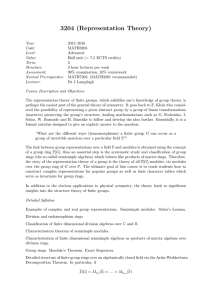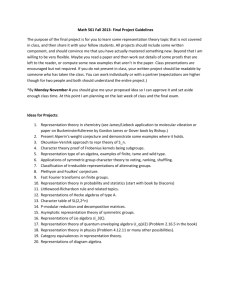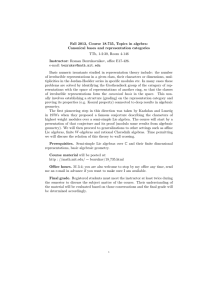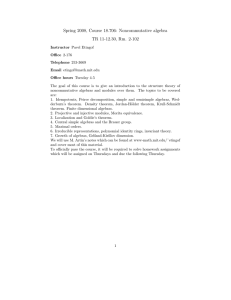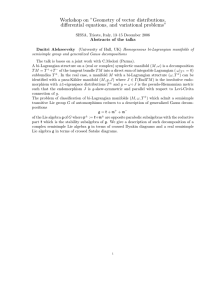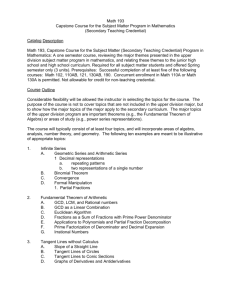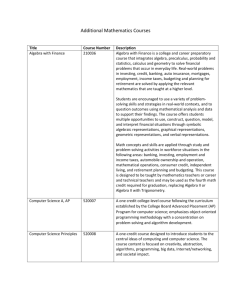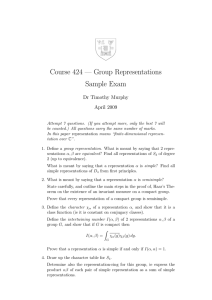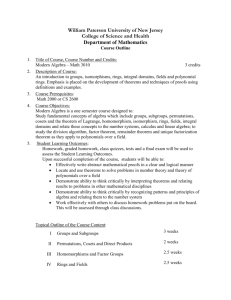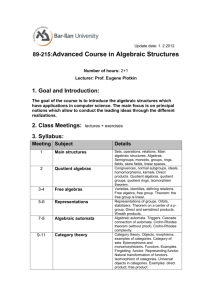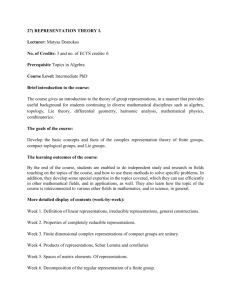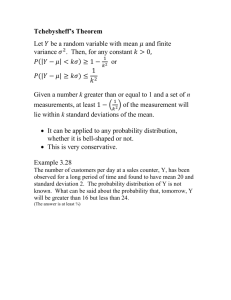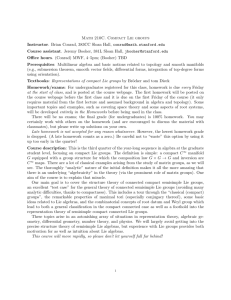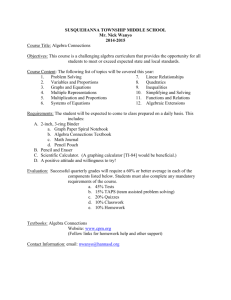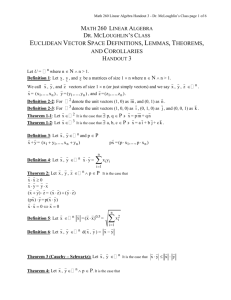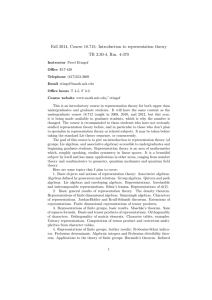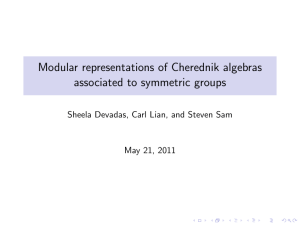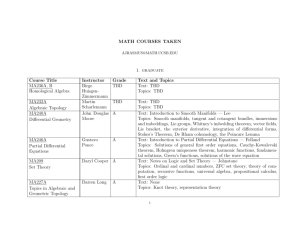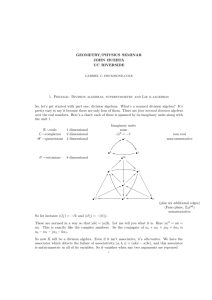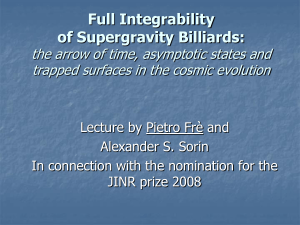topics in algebra - CEU E
advertisement
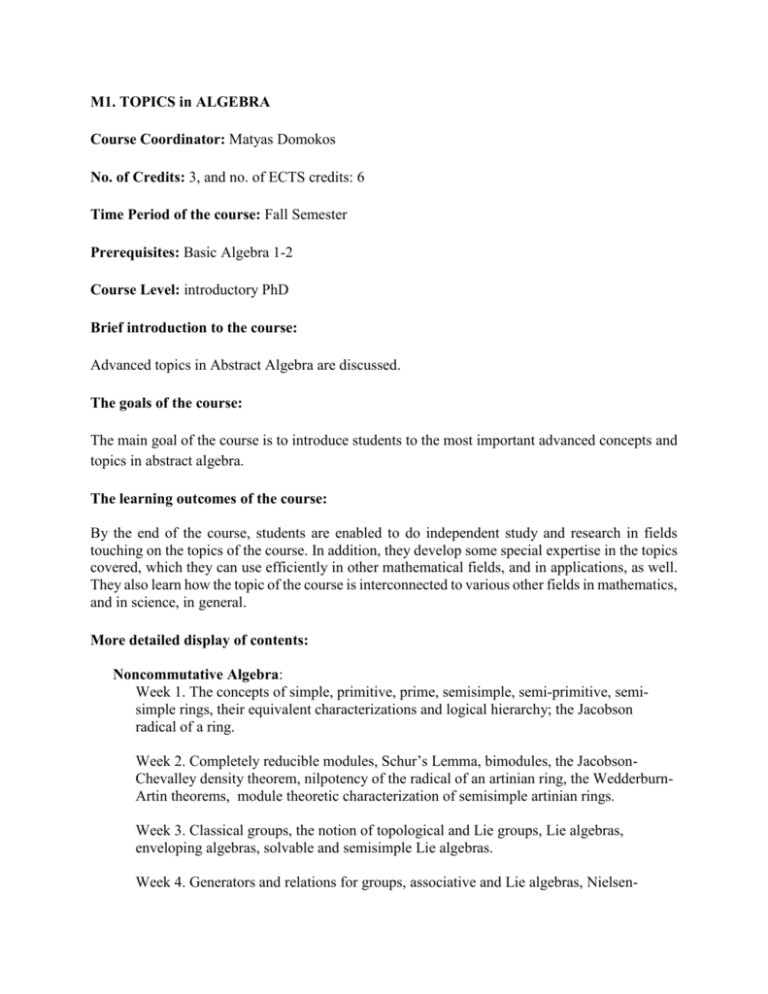
M1. TOPICS in ALGEBRA Course Coordinator: Matyas Domokos No. of Credits: 3, and no. of ECTS credits: 6 Time Period of the course: Fall Semester Prerequisites: Basic Algebra 1-2 Course Level: introductory PhD Brief introduction to the course: Advanced topics in Abstract Algebra are discussed. The goals of the course: The main goal of the course is to introduce students to the most important advanced concepts and topics in abstract algebra. The learning outcomes of the course: By the end of the course, students are enabled to do independent study and research in fields touching on the topics of the course. In addition, they develop some special expertise in the topics covered, which they can use efficiently in other mathematical fields, and in applications, as well. They also learn how the topic of the course is interconnected to various other fields in mathematics, and in science, in general. More detailed display of contents: Noncommutative Algebra: Week 1. The concepts of simple, primitive, prime, semisimple, semi-primitive, semisimple rings, their equivalent characterizations and logical hierarchy; the Jacobson radical of a ring. Week 2. Completely reducible modules, Schur’s Lemma, bimodules, the JacobsonChevalley density theorem, nilpotency of the radical of an artinian ring, the WedderburnArtin theorems, module theoretic characterization of semisimple artinian rings. Week 3. Classical groups, the notion of topological and Lie groups, Lie algebras, enveloping algebras, solvable and semisimple Lie algebras. Week 4. Generators and relations for groups, associative and Lie algebras, Nielsen- Schreier theorem. Group Actions and Representation Theory: Week 5. Basic concepts of group representations, the space of matrix elements associated to a finite dimensional representation, dual representation, permutation representations, the two-sided regular representation, group algebras, Maschke’s theorem. Week 6. Tensor products of vector spaces (and more generally of bimodules), product of representations, the irreducible representations of a direct product, induced representations. Week 7. Unitary representations, orthogonality of unitary matrix elements of irreducible complex representations of a finite group or a compact group, characters, examples of character tables, the dimension of an irreducible representation divides the order of the group, Burnside’s theorem on solvability of groups whose order has only two prime divisors or the theorem on Frobenius kernel. Week 8. Group actions in various areas of mathematics (e.g. Cayley graphs, actions on manifolds,automorphism groups). Commutative and Homological Algebra: Week 9. Integral extensions, the Noether Normalization Lemma, the existence of a common zero of a proper ideal in a multivariate polynomial ring over an algebraically closed field, the Hilbert Nullstellensatz, differential criterion of separability. Week 10. Localization, associated primes, primary ideals, the Lasker-Noether theorem for finitely generated modules over a noetherian ring. Week 11. Affine algebraic sets and their coordinate rings, rational functions, local rings, the Zariski topology, the prime spectrum. Week 12. Free and projective resolutions, the Hilbert syzygy theorem. References: 1. N Jacobson, Basic Algebra II, WH Freeman and Co., San Francisco, 1974/1980. 2. I M Isaacs, Algebra, a graduate course, Brooks/Cole Publishing Company, Pacific Grove, 1994
